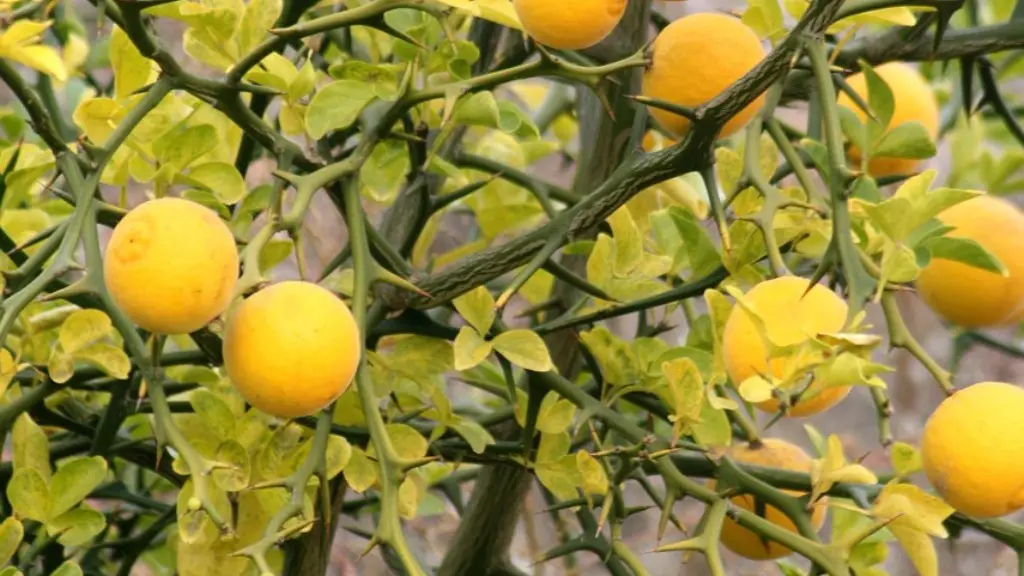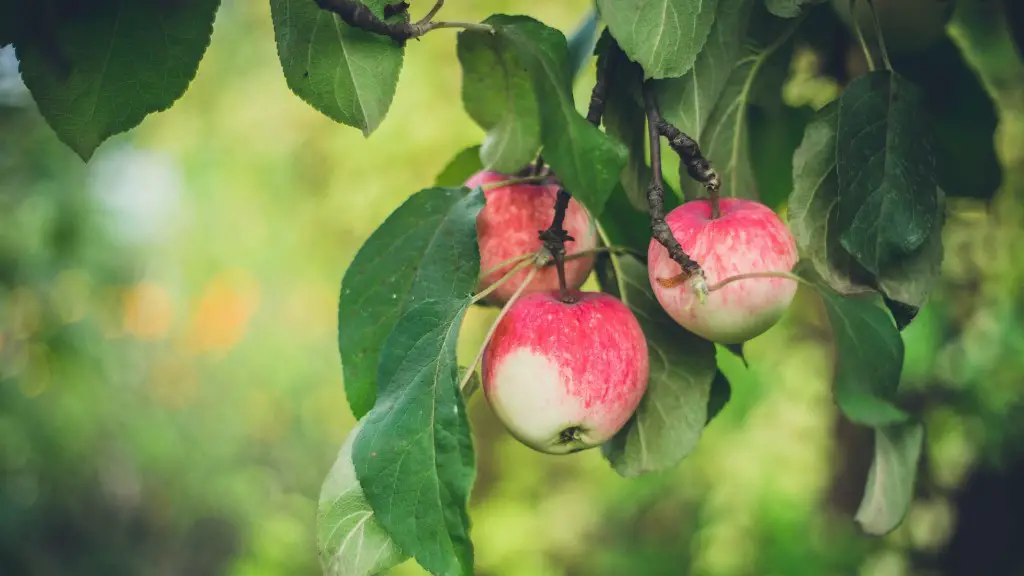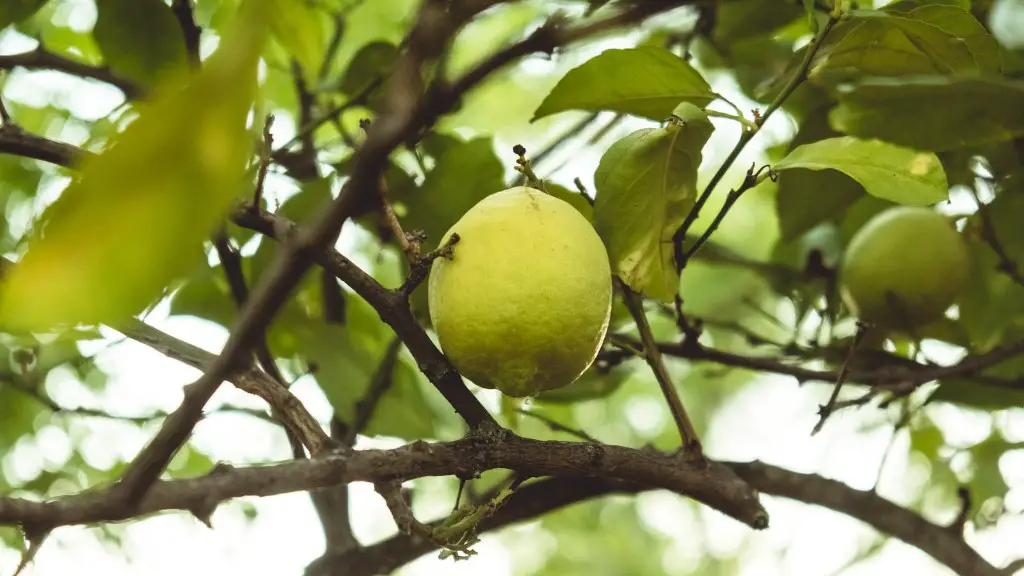Yes, you can over fertilize a lemon tree. Excessive fertilizer can have a detrimental effect on the tree’s health, which can ultimately lead to a decline in vitality and a decrease in fruit production. To prevent this from happening, it is important to fertilize your lemon tree properly. The key is to understand when and how much to fertilize the tree.
When to fertilize your lemon tree largely depends on the variety you have and the climate where you live. Citrus trees need more nitrogen during the growing season, and it’s best to fertilize in the spring, late spring, and early fall. If you live in an area that has a warmer climate, you might also want to consider fertilizing in the winter and early summer months.
The amount of fertilizer you use is also important. Generally, you should use a fertilizer that is high in nitrogen, but not too high. Too much nitrogen can cause the tree to grow too quickly and create leggy foliage, or excessively long and thin branches. You should follow the directions on the package of fertilizer to determine how much to use and when to apply it.
In addition to fertilizing your tree, you should also take into account the soil it is planted in. When choosing a soil for your lemon tree, it should be well draining and high in organic matter. Test the soil to determine its pH level before planting the tree and add amendments as needed to achieve a pH level between 6-7. This will ensure that the nutrients in the soil are available to the tree.
Finally, it is important to water your lemon tree properly. Even though lemon trees like to be kept on the dry side, they need to be watered regularly. Make sure the soil does not dry out completely and water deeply when you do water. This will encourage a strong root system, which will help the tree take up the nutrients it needs.
When to Fertilize a Lemon Tree
The timing of fertilization is important when it comes to keeping your lemon tree healthy. Fertilize your tree in the spring, late spring, and early fall to ensure that your tree has the nutrients it needs to grow and produce fruit. If you live in a warmer climate, you may also fertilize in the winter and early summer months. This will give your tree the nutrients it needs to remain healthy throughout the year.
It’s also important to remember that different citrus varieties require different amounts of fertilizer. Some varieties may need more or less depending on your climate. Check the fertilizer package for specific instructions on how much and when to fertilize your lemon tree.
You should also be aware of the potential adverse effects of over-fertilizing. Too much nitrogen can cause the tree to grow excessively and create leggy foliage, or excessively long and thin branches. It is best to avoid over-fertilizing your lemon tree and stick to the package instructions.
Finally, be sure to check the pH level of your soil before planting your lemon tree. Test your soil and add amendments if needed to achieve a pH level between 6-7, which will ensure that the nutrients in the soil are available to the tree.
Types of Lemon Tree Fertilizers
There are many types of fertilizer available for lemon trees, including organic and inorganic options. Organic fertilizers, such as compost and manure, are a slow-release fertilizer that provides your tree with necessary nutrients over time. Inorganic fertilizers, such as synthetic fertilizers, are fast-release and provide the tree with an immediate boost of nutrients.
Organic fertilizers are generally considered a better option than inorganic fertilizers because they are more natural and can help improve the soil structure as well as provide your tree with nutrients. Organic fertilizers are also less likely to burn your tree or cause other problems, such as encouraging leggy growth. It is best to use a combination of both organic and inorganic fertilizers to ensure your tree is receiving the nutrients it needs.
When choosing a fertilizer, be sure to look for one that is high in nitrogen, but not too high. Too much nitrogen can cause excessive growth and create leggy foliage. To prevent this from happening, read the directions on the package of fertilizer to determine how much to use and when to apply it.
No matter which type of fertilizer you choose, it is important to remember that too much fertilizer can be detrimental to the tree’s health. Make sure you always follow the directions on the package and apply the fertilizer at the recommended intervals.
Signs of Over Fertilization
Sometimes, the signs of over-fertilizing are not obvious until it is too late. Too much nitrogen can cause the leaves to turn yellow, the foliage to become sparse, or the plant to grow too quickly. These can be signs of nitrogen run-off, which can be dangerous to the health of your lemon tree.
If you suspect that your tree is over-fertilized, check the leaves for signs of discoloration or wilting. The soil around the tree could also be a telltale sign of over-fertilization. If the soil has a salty, burnt odor, it could mean that the tree has been over-fertilized.
If you notice any of these signs, it is important to stop fertilizing the tree immediately. Then, you should water the tree deeply to flush any excess fertilizer out of the soil. If the signs of over-fertilizing persist, you may need to consider repotting the tree in fresh, nutrient-rich soil.
Nutrient Deficiency Signs
On the other hand, failing to fertilize your lemon tree can also be detrimental. A lack of nutrients in the soil can cause yellow leaves, a sparse canopy, or stunted growth. This is because the tree is not getting the essential nutrients it needs to thrive.
An easy way to determine if your lemon tree is suffering from a nutrient deficiency is to get a soil test. A soil test will tell you the pH level of the soil and what nutrients are lacking. Once you’ve determined what nutrients are lacking, you can then add the appropriate fertilizer to the soil.
It’s also important to be aware that different soils require different amounts of fertilizer. Sandy soils are generally lower in nutrients and will require more fertilizer than clay soils. Make sure to read the package instructions for specific amounts and timings for different soil types.
Finally, keep in mind that the more natural the fertilizer, the better. Organic fertilizers, such as compost and manure, are slow-release and provide the tree with necessary nutrients over time. Synthetic fertilizers are fast-release and can provide your tree with an immediate boost of nutrients, but they also come with the risk of over-fertilization.
Fertilizing Tips
When it comes to fertilizing your lemon tree, the key is to not overdo it. Too much fertilizer can be damaging to the tree’s health, so it is important to follow the directions on the package and apply the fertilizer at the recommended intervals.
It is also important to water your tree properly. Even though lemon trees prefer to be kept on the dry side, they still need to be watered regularly. Make sure the soil does not dry out completely and water deeply when you do water. This will encourage a strong root system, which will help the tree take up the nutrients it needs.
You should also make sure your lemon tree is planted in soil that is well-draining and high in organic matter. Test the soil to determine its pH before planting your tree and add amendments as needed to achieve a pH level between 6-7. This will ensure that the nutrients in the soil are available to the tree.
Finally, don’t forget to fertilize your tree! Lemon trees require more nitrogen during the growing season. Fertilize in the spring, late spring, and early fall. Depending on the climate where you live, you may also want to consider fertilizing in the winter and summer months, as well.





